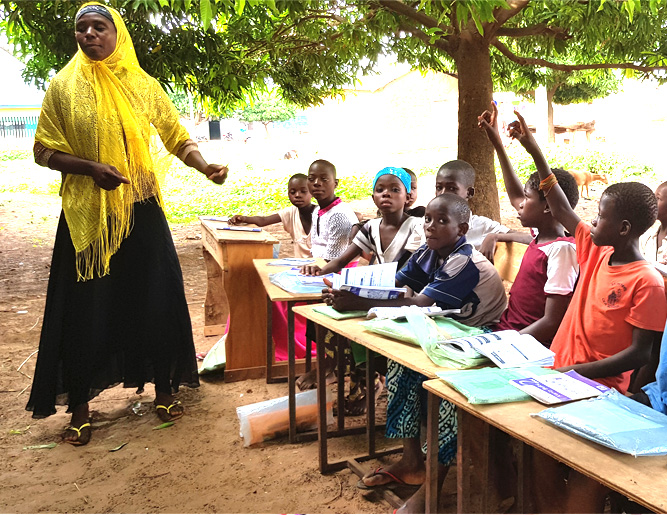
- April 5, 2022
- 0 Comments
- 5990 Views
- 2 Likes
- Research Works
EDUCATION RESEARCH
COMPLEMENTARY EDUCATION
Complementary Basic Education Programme, Government of Ghana and DFID supported (Feb, 2013 to November 2018)
Associates for Change in collaboration with Crown Agents UK are currently managing a five year Complementary Basic Education Programme. AfC is managing the research, monitoring and evaluation technical support and oversight which entail providing educational advisory services to the Ghana Education Service. AfC has a Senior Education Advisor, an M&E Manager and M&E Officer providing technical advisory support to the Government of Ghana and 10 Non-Governmental organisations implementing the Complementary Basic Education Programme. AfC also sees to all the monitoring framework and curriculum material development and assessment processes which are part of the project. Some of the activities AfC engaged in include:
- Providing technical advisory support to the Government of Ghana and several Non-Governmental organisations implementing the Complementary Basic Education Programme.
- Oversight to the all the material development and assessment processes which are part of the project.
- Oversight to the Research and monitoring, evaluation component to the project.
http://www.cbe.ges.gov.gh/
UNICEF Out of School Children Study, Ghana Country Report, UNICEF Ghana (2011):
AfC was contracted to conduct a comprehensive, and analytical review of bottlenecks and barriers related to Out of School Children (OOSC) in Ghana. The assignment involved the collection and review of relevant literature on OOSC in Ghana and elsewhere using the global OOSC methodological framework developed by the UN Institute of Statistics and UNICEF. The study involved an extensive literature review, analysed and synthesised existing evidence concerning barriers/bottlenecks for OOSC and effective policies/strategies to address the barriers/bottlenecks to children�s access, retention and completion of basic schooling in Ghana. The study involved an investigation into the socio cultural, economic, supply and institutional constraints, barriers and policies to improve the conditions for out of school children within the Ghanaian context.
http://www.uis.unesco.org/Library/Documents/out-of-school-children-ghana-country-study-2012-en.pdf
**************************
Executive Summary, Policy Brief Full Report
Reaching Underserved Populations with Complementary Education: Lessons from Ghanaian State and Non State Sector by Leslie Casely-Hayford and Ash Hartwell
This article explores the impact efficiency and effectiveness of non state provision of basic education for children and their families in rural deprived areas and the potential impact non state provision can make in achieving basic literacy outcomes for children mainstreamed into the public education system. The article explores how NGO programmes of this nature complement the efforts of state systems by providing children who would have otherwise not received primary education a chance at formal education. The article is based on findings from an impact evaluation which explores the outcomes of the School for Life programme in northern Ghana. (see Journal of Development in Practice, June 2010)
http://www.uis.unesco.org/Library/Documents/out-of-school-children-ghana-country-study-2012-en.pdf
The Leap to Literacy and Life Change in Northern Ghana: The School for Life Impact Assessment
School for Life (SfL) is a non formal literacy program for children between the ages of 8 to 14. The program was designed to assist children that have not entered the formal education system due to their social and economic barriers to education in Northern Ghana. The program is a flexible school model with learning hours in the afternoon when children are free from their home and farming responsibilities; the program is facilitated by a youth from the community who is literate in the mother tongue language. The programme started in 1995 and has reached over 80,000 children in northern Ghana.
The School for Life Impact Assessment (IA) was designed to be a “high level strategic exercise” focusing on replication and mainstreaming possibilities of SfL. The main focus of the study was aimed at providing an assessment of the impact of the SfL programme on the participants, families, communities, Facilitators and schools which have received SfL support. There are three reports presented here: the short executive summary of the impact assessment (the SFL pamphlet); the second document is the abridged version of the main report (abridged version) and the final report which contains the detailed report of findings.
